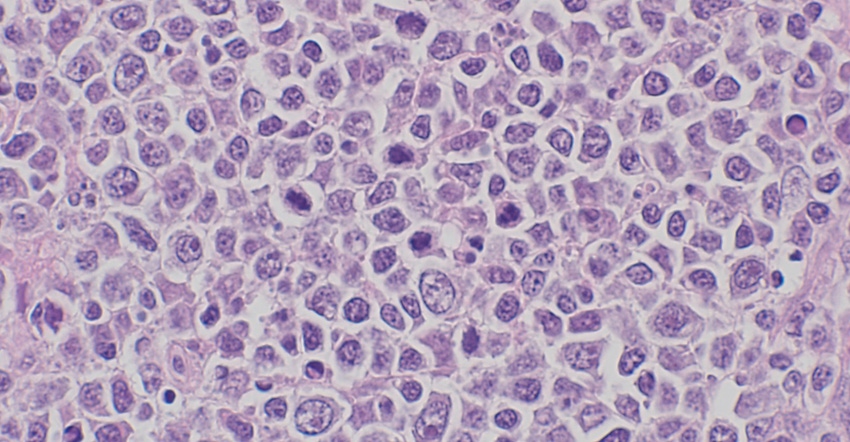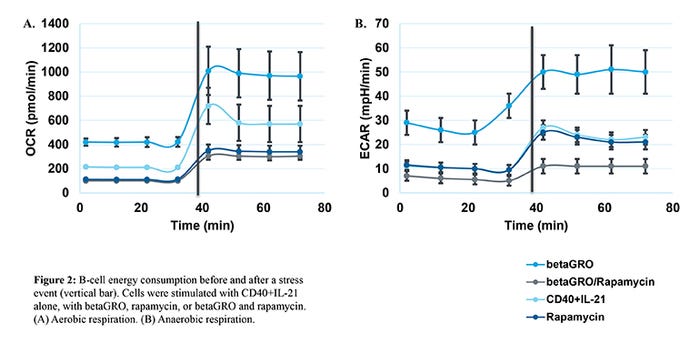Targeting Immune Cell Energetics To Produce Healthy Pigs
Pig health is enhanced through increased cellular energetics, mediated by mTOR pathway signaling. betaGRO® appears to stimulate immune cell response through this mechanism.
January 31, 2018

Sponsored Content
Improving pig health enhances the well-being and results in a better performing and more profitable pig. A stable health status is maintained through a combination of proper biosecurity, genetics, nutrition, management and disease treatment protocols. This article focuses on a nutrition intervention that aids the pig’s adaptive immune response. The effectiveness of the adaptive immune response is determined by the ability of individual immune cells, including B lymphocytes (B-cells) that make antibodies, to quickly respond to immune challenge. Immune cell metabolic energetics are a good indicator of their ability to cope with these challenges.
According to a recent review by Olenchock et al. (2017), immune cell energetics are regulated by signaling factors and the microenvironment within tissues. A molecule of interest, due to its immunomodulatory effects, is insulin-like growth factor-1. IGF-1 elicits its biological function through the mammalian target of rapamycin pathway signaling. Active immune cells have upregulated mTOR pathway signaling and exhibit greater glucose consumption levels to support this increased activity (Figure 1). The mTOR pathway signaling affects humoral B-cell proliferation and differentiation through independent mechanisms and is required for B-cell survival and function (Fruman and Limon, 2012).

betaGRO® is a commercially available feed ingredient that can increase circulating IGF-1 levels. Vaughn et al. (2017) illustrate that betaGRO® contains molecular functionality at the cellular level through mTOR pathway signaling in muscle progenitor cells. This effect, along with the role of IGF-1 on immune cell energetics, led to the evaluation of the B-cell energetics in response to betaGRO® nutritional supplementation. For this evaluation, porcine B-cells were obtained from spleen preparations by magnetic selection using a B-cell specific antibody. The B-cell energetics were assessed by stimulating B-cells in the presence of CD40 ligand and the pro-inflammatory cytokine, interleukin-21, with or without betaGRO®, and with or without rapamycin. Rapamycin specifically inhibits mTOR pathway signaling and activity. Because of this inhibitory effect, it clarifies if betaGRO® affects the B-cells and the immune system through mTOR pathway signaling. This helps us understand why feeding betaGRO® during a gut or respiratory immune challenge can improve immune response and animal performance.

We measured the aerobic respiration response of the B-cells to betaGRO® by measuring the oxygen consumption rate. Anaerobic respiration or glucose consumption was evaluated by measuring the extracellular acidification rate. Results from this experiment are illustrated in Figure 2. When extreme stress was induced, both aerobic and anaerobic metabolism were elevated among all treatments. They were further increased when the B-cells were supplemented with betaGRO®. When rapamycin was added, the beneficial effects of betaGRO® on both aerobic and anaerobic metabolism were negated. This effect suggests that the bioactive proteins within betaGRO® stimulates the immune response through the mTOR signaling pathway. It is also consistent with the beneficial effects observed in fetal and neonatal muscle cell activity reported previously (Vaughn et al., 2017).
Implications: Immune cell energetics directly affect the ability of immune cells to mount an effective immune response when a pig’s immune system is challenged. When the B-cell metabolism rate is elevated, the body can more readily respond to an immune challenge. Nutrients that stimulate the mTOR pathway signaling activity is critical to this function. The mTOR pathway signaling is stimulated through IGF-1 receptor binding, which is highly bioavailable in betaGRO®. Data from this study indicate that betaGRO® stimulates B-cell energetics through the mTOR pathway. These effects support the observation that feeding betaGRO® improves the recovery and performance of pigs subjected to a variety of pathogenic immune challenges.
Fruman, D. A., and J. J. Limon. 2012. Akt and mTOR in B cell activation and differentiation. Frontiers in immunology 3:228.
Olenchock, B. A., J. C. Rathmell, and M. G. Vander Heiden. 2017. Biochemical underpinnings of immune cell metabolic phenotypes. Immunity 46(5):703-713.
Vaughn, M., K. Phelps, and J. Gonzalez. 2017. In vitro supplementation with the porcine plasma product, betaGRO®, stimulates activity of porcine fetal myoblasts and neonatal satellite cells in a divergent manner. Animal : an international journal of animal bioscience:1-9.
Co-authored by:
Mathew A. Vaughn, Ph.D., Research Associate, Puretein Bioscience LLC
Michael Rahe, DVM MPH Ph.D., Postdoc Research Associate Veterinary Diagnostic and Production Animal Medicine, Iowa State University
Joe Loughmiller, Ph.D., Vice President, Puretein Bioscience LLC
Michael P. Murtaugh, Professor, Department of Veterinary and Biomedical Sciences, University of Minnesota
betaGRO® distributed by NutriQuest®.
About the Author(s)
You May Also Like



